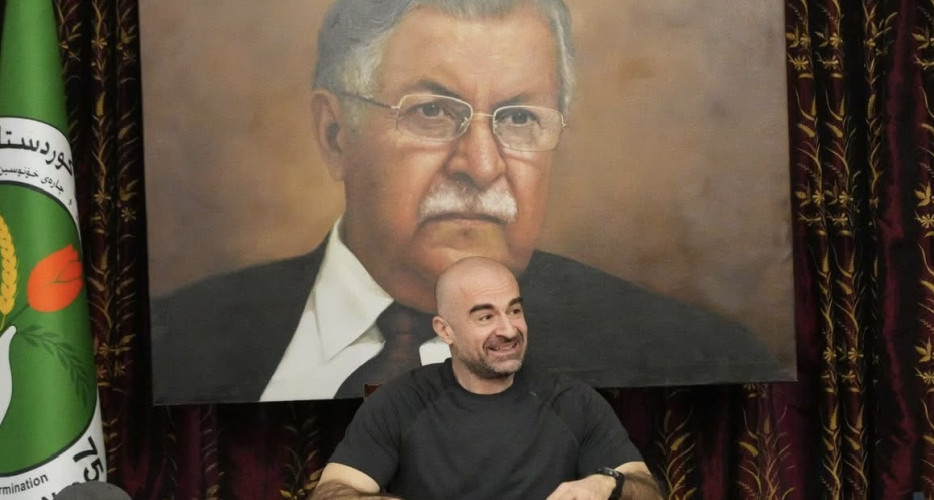Bafel Talabani Welcomes Erbil-Baghdad Oil Agreement, Stresses Dialogue as Strategic Path

Peregraf
Bafel Jalal Talabani, President of the Patriotic Union of Kurdistan (PUK), has welcomed the landmark agreement between the Kurdistan Regional Government (KRG) and the federal Government of Iraq, describing it as a significant achievement for the people of Kurdistan and a model for resolving disputes through dialogue.
In a statement, Talabani congratulated the people of Kurdistan and expressed gratitude for their patience during years of financial uncertainty and political tension.
“I sincerely welcome the agreement between the Kurdistan Regional Government and the Government of Iraq. I extend my congratulations to the people of Kurdistan and express my gratitude for their patience and perseverance,” he said.
Talabani emphasized that dialogue has always been, and remains, the strategic path to resolving issues with Baghdad. “We have always believed, and continue to affirm, that dialogue and negotiation are the best means to resolve disputes and to achieve the desired outcomes in the interest of our citizens,” he added.
The PUK leader expressed hope that the agreement would better serve the people of Kurdistan and ensure justice in the distribution of Iraq’s national wealth, while safeguarding the Region’s rightful constitutional entitlements. “We regard dialogue with Baghdad as the strategic path to resolving issues, and through it, we can best serve our people and our Region,” he said.
Talabani also thanked all parties who supported the negotiations, underscoring that cooperation and constructive engagement remain essential to securing the Kurdistan Region’s rights within Iraq’s federal framework.
Oil exports to resume September 27
According to the agreement, oil from the Kurdistan Region is scheduled to reach the global market through the KRG-Ceyhan pipeline starting Saturday, September 27, 2025, at 6:00 a.m., marking the first exports in more than two years.
Iraqi Prime Minister Mohammed Shia’ al-Sudani hailed the deal as “an achievement 18 years in the making,” saying it ensures fair wealth distribution, diversification of export outlets, and encouragement of investment.
The agreement, comprising six main articles and a preamble, clearly defines the rights, entitlements, and obligations of all three parties. Under its framework, all crude oil produced in the Kurdistan Region—except volumes allocated for local consumption—will be delivered to the Iraq National Oil Company (SOMO) for export via Turkey. Revenues will be returned to the federal treasury in Baghdad, then allocated to fund salaries and other entitlements in the Kurdistan Region.
KRG hails “historic agreement”
The Kurdistan Regional Government welcomed the deal, with Prime Minister Masrour Barzani describing it as “the result of tireless efforts by teams and delegations from all parties,” including the Kurdistan Region, oil-producing companies, the Federal Ministry of Oil, and SOMO.
“With this step, the Kurdistan Region reconnects to global oil markets,” Barzani wrote on X (formerly Twitter). “On this historic day, a major obstacle to securing the financial dues of the people of Kurdistan was removed. With the resumption of oil exports, we emphasize the need to fulfill all constitutional rights of the Kurdistan Region.”
The KRG’s Ministry of Natural Resources confirmed that exports would resume within 48 hours, following the trilateral agreement with the federal Ministry of Oil and international oil companies operating in the Region. Officials said a joint meeting to oversee operations is scheduled for Saturday morning.
Ending a two-year deadlock
The deal ends more than two years of deadlock, which began in March 2023 after an international arbitration ruling in Paris sided with Baghdad in its dispute with Ankara over the operation of the Iraq-Türkiye pipeline. That ruling halted Kurdish oil exports through Turkey’s Ceyhan port, cutting off nearly 230,000 barrels per day from international markets and leaving the Kurdistan Region without a key source of revenue.
The Iraqi Federal Ministry of Oil emphasized that exports under the new arrangement will comply with the country’s constitution, the Federal General Budget Law, and decisions of the Federal Court. The ministry underlined transparency in revenue management and said the deal would strengthen public finances, increase budget revenues, and improve the government’s ability to fund services and development projects across Iraq
Looking ahead
With exports set to restart this weekend, both Erbil and Baghdad have signaled a new chapter in relations. For the Kurdistan Region, the deal promises stability in salary payments and financial entitlements. For the federal government, it strengthens control over oil revenues while re-establishing Iraq as a reliable player in global energy markets.
Talabani concluded his remarks by reaffirming his party’s support for dialogue as the only viable path forward: “Through dialogue with Baghdad, we can best serve our people and our Region.”